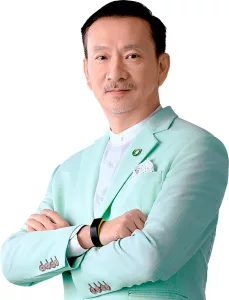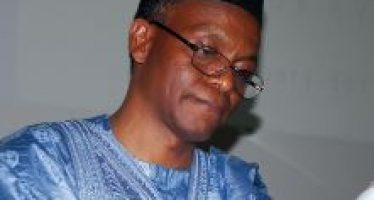A Simple Man with a Simple Plan: Saving the World Via Commitment to a Greener, Cleaner, Future…
The head of Thai group Bangchak, Chaiwat Kovavisarach, speaks to CFI.co about his vision for the future of clean energy

Group Chief Executive Officer and President: Mr Chaiwat Kovavisarach
As the Bangchak Group marks its 40th anniversary in 2024, embarking on its fifth decade of operation, the Thai company remains fully committed to its position as a leader in the field of energy transition.
“We recognise the importance of addressing and balancing the ‘energy trilemma’ in shaping the future of our industry,” says Group CEO and president Chaiwat Kovavisarach.
Bangchak knows well that navigating the complexities of the energy-transition space demands significant time, investment, and strategic R&D. “We are dedicated to fostering a sustainable business and ecosystem that integrates clean-energy development, carbon management, and future fuel solutions.”
Mr Chaiwat says his company vision – Crafting a Sustainable World with Evolving “Greenovation” – encapsulates a commitment to driving innovation and transformative change for a more sustainable world.
“With our BCP 316 NET Plan, Bangchak Group spearheads the transition towards a low-carbon society,” the CEO says. “Our targets are to achieve carbon-neutrality by 2030, and net-zero greenhouse gas emissions by 2050.”
This plan has four strategic dimensions.
- Breakthrough performance (efficiency and process improvement of 30 percent)
- Conserving Nature and society (green and blue carbon – 10 percent)
- Proactive business growth and transition (Green Portfolio, future technology, and carbon offset – 60 percent).
- “We’re advancing our clean energy initiatives through BCPG, encompassing solar, wind, hydro, natural gas, energy transmission, and storage,” says Mr Chaiwat. “Our bio-based products are being developed through BBGI. We are set to start commercial production of sustainable aviation fuel (SAF) derived from used cooking oil.”
The company is dedicated to supporting the net-zero target, including business and the promotion of accompanying policies, standardisation, and engaging with stakeholders. This will include:
- Providing low-carbon fuels and services through BFPL to reduce transport emissions
- Introducing an EV motorcycle-rental service with an automatic battery-swapping network
- Co-founding the Carbon Markets Club to facilitate carbon credit-trading, and elevate public awareness of climate change and mitigation strategies
In 2023, BCPG launched the Carbon Footprint of Organisation Calculator (CFO) for its members, which can be used to conduct self-assessment of emissions to support emission reduction.
Last year was a historic one for Bangchak Group, with some stand-out developments. “We strengthened our business by acquiring the common shares of Bangchak Sriracha Public Company Ltd (formerly Esso Thailand),” says Mr Chaiwat. “This strategic acquisition enriched our asset base with an oil refinery, oil terminal network, and service stations nationwide, reinforcing our position in the energy sector.”
The group also pioneered Thailand’s first SAF-production unit. Once SAF is ready for commercial operations (anticipated for Q1/2025), it is likely to pave the way for a “Book and Claim” system that supports eco-friendly travel.
Bangchak prides itself on being at the forefront of the eco-revolution, pioneering various initiatives. It was the first to commercialise renewable energy (gasohol and biodiesel) in the Thai market. It also built Thailand’s first solar-power plant in Ayutthaya province, paving the way for future expansion.
Bangchak was the first Thai company to invest in lithium mining, an essential element for battery production.
Bangchak Phra Khanong Refinery has transformed into a complex eco-refinery for Thailand’s first and only sustainable aviation fuel (SAF) producer, derived from used cooking oil. SAF has the potential to significantly reduce CO2 emissions by up to 80 percent. There has been expanded synthetic biology (“SynBio”) competency, with the construction of South East Asia’s first large-scale biotechnology plant (CDMO).
ESG is an integral part of Bangchak’s business practices. The company is committed to developing sustainable innovations in harmony with the environment – and society.
Bangchak emphasises balance within these principles, being accountable to all stakeholders, and taking responsibility for environmental protection while upholding good corporate governance.
The development of biofuels – Gasohol and Biodiesel – form an exciting path for the group. Blending petrol or diesel with ethanol and methyl-ether produced from agricultural crops reduces the volume of imported crude oil, and supports the livelihoods of sugarcane and cassava farmers.
SAF production aligns with the Bio-Circular-Green or BCG Economy Model, while the Winnonie-EV motorcycles service platform provides access to clean mobility solutions.
And powering vehicles is only part of it. There is also the Bio-Cup from Inthanin Coffee. This is Bangchak Group’s coffee brand introduced in compostable cups to reduce single-use plastics.
“Bangchak Group faces several mid- to-long-term challenges as we navigate the evolving landscape of the energy sector,” the CEO admits. “A primary concern is sustaining the momentum of our initiatives while effectively balancing the energy trilemma.
“We are committed to fostering technological innovations that can significantly enhance operational efficiency and resilience. We remain vigilant and adaptable, prepared to respond to disruptive developments that may emerge unexpectedly.”
The group’s diverse business portfolio presents opportunities – and challenges. “We are focused on fostering synergy and synchronisation across this diverse portfolio to optimise efficiency and mitigate potential disruptions.”
To ensure the transition to clean, renewable, and sustainable energy, the group makes substantial investments in R&D. “Energy Storage is critical,” says Mr Chaiwat, “and the future of energy will be one of diversity, as no single solution can meet the growing demand.
“We anticipate considerable volatility in energy prices during this transformative phase. Such fluctuations pose challenges in maintaining a balanced energy trilemma.
Mr Chaiwat is inspired by the interconnectedness of global business, which underscores the universal need for energy and collective responsibility to address climate change.
“The availability of sustainable energy solutions signifies a promising future,” he adds. “It’s only a matter of time before we integrate these solutions. As a large corporation, we can make meaningful contributions in driving this transition and shaping the future of energy.”
The transformative potential of generative AI, which could revolutionise the energy sector and various other industries, is also part of the game plan. “AI is a powerful tool that can help us achieve what may seem impossible.
“The fast-paced and dynamic nature of the business world requires the continuous evolution of the energy sector – and our ongoing adaptation and innovation efforts.”
In the dynamic and challenging business landscape, Bangchak seeks to maintain its success through effective management that drives performance and aligns with broader societal and environmental goals.
“From very early on, we have been committed to sustainable business innovation in harmony with the environment and society, and always stay ahead of the curve.”
Like many company leaders, Mr Chaiwat sees people as his group’s greatest strength. “Our employee culture is to be virtuous, knowledgeable, and to contribute to others.” Core Values include innovation, agility, mobility, boldness, customer empathy, passion, and ownership.
“At the helm of Bangchak, I am tasked with crafting a compelling, forward-looking vision that resonates with our team and inspires them to strive for excellence,” says the president and CEO. “Bangchak’s core values were revised to embrace a forward-thinking, can-do mindset.
“Agility and mobility are critical values in today’s dynamic business environment. To drive innovation, a leader must accommodate boldness, creativity, experimentation, and continuous development – and provide necessary support, incentives, and opportunities.
“Most importantly, effective leadership hinges on inspiring and uniting others. A corporate leader must be adept at rallying the team and cultivating a sense of unity and enthusiasm that drives collective efforts toward achieving shared goals and realising the organisational vision.”
You may have an interest in also reading…
Kiran Shaw and Biocon: What a Team
Kiran Mazumdar Shaw is the founder and managing director of Biocon which is one of Asia’s leading biotech enterprises. Shaw’s
WB, Vietnam Sign US$ 500 Million Loan to Improve Energy Efficiency
Hanoi, November, 2014 – The State Bank of Vietnam and the World Bank today signed a US$ 500 million loan
Nasir Ahmad El-Rufai, Good Governance Group: Stunted Potentials Hobble Africa’s Giant
These days, Nigeria is often in the news for the wrong reasons. It is a country devastated by poverty, insecurity,


















































































